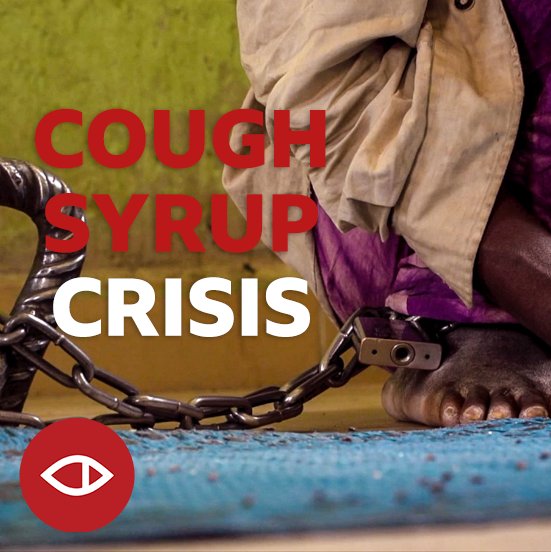
The BBC's "Africa Eye" explored the wide use of codeine in Nigeria following a visit to a rehab center located in the northern part of the country.
This was captured in its video report titled "Sweet Sweet Codeine".
The clip introduced individuals who have lost the power of self control due to an addiction to the drug substance often patronised by youths.
A party or hangout is never complete without the presence of the savage guest, codeine.
The hazardous effect on people who have fallen hard to an uncontrolled use of the intoxicant is perhaps why some were resigned to shackles as can be seen in the BBC documentary.
A common use of codeine in Nigeria will have found better justification if everyone was dealing with a daily cough problem but that is evidently not the case.
Though not specifically addressing the problem in Nigeria, American rapper, J Cole, who was hosted at a Lagos-held concert on Friday, April 27, 2018, called for caution in his recently released album, "KOD", while local musicians took a point-of-view bothering on amusement.
These 3 cities are the epicenters of Nigeria's drug crisis
Regardless of what city you're in, nowadays it's nearly impossible to avoid reading, hearing or watching some bit of news with the words "drug abuse", "drug crisis", or more specifically, "tramadol" or "codeine" scribbled on the pages or muttered by a news host.
Nigeria's drug crisis (see what I was saying) has gradually grown more troubling as the government and most of society struggles to deal with the circumstances that have made young Nigerians prone to experimentation and drug abuse.
You've probably heard the story before.
Most of Nigeria's land border is non-existent, barely standing or bewildering in how porous the most guarded checkpoints can be if you know what to do.
Drug regulation is poor. The youth are unemployed, disengaged and frustrated by a country that seems to have it in for them.
Naturally, some cities have proved more prone to the result of these factors, perhaps by way of an already present drug culture, crime or population.
Here are the 3 cities you are most likely to hear about when someone on the news mentions Nigeria and drug overdose in the same sentence.
(1) Lagos:
The city of sin, money and excellence, Lagos is usually ground zero for whatever social or cultural trends are picked up by youths across the country.
Like most of its so-called sister cities, the city's positioning as a commercial and entertainment hub, as well as its vibrant social and night life have made a hub for drug use for decades.
ALSO READ: Tramadol user loses his grip in Lagos
Nowadays, the biggest influence in the city is a culture it has created on its own; one that combines inspirations from American pop culture with its old history and one of the largest population of young people that any city can boast of.
In slums in Mushin and many of the city's most notorious inner communities, drug use is rife. Opioids like Tramadol are heavily abused and, no thanks to an absence of regulation, it is far too easy to get drugs, either from unregistered pharmacies or traders who pack an assortment in rectangular boxes.
On the other side of Third Mainland Bridge, more exotic designer drugs are the rave. You will find them at parties, in white lines on a young girl's palm in the club or in a needle in the arm of young professionals.
Someone once said drugs are almost legal in Lagos; one finds that it is difficult to contest with him.
(2) Kano:
Once the jewel of the North, Kano is now the centre of the codeine epidemic in the North of Nigeria.
The city is known as the cultural centre of the north, and while strong conservative values are the law, and alcohol is now sold or consumed in public, the youth are ripping paper packs and finding euphoria at the bottom of Tutolin bottles.
Drug dens are scattered all over the city.
Here, a cocktail of drugs is a few conversations away and large groups of young men can be seen in most of these at any given time. A key factor is the opportunity in big numbers that make Kano a favourite of locally-based illegal drug manufacturers.
Kano has nearly 20 million people by some estimates; making it the most populated state, followed closely by Lagos. More than half of this population is below 30.
As with most Nigerian cities, Tramadol is the most commonly used drug and the demand is met with a steady, obscene supply.
In February, the Nigerian drug law enforcement agency, NDLEA, found a massive tranche of tramadol, estimated to be worth 19 million naira, hidden in cartons of Indomie instant noodles in Yola, ostensibly to be distrubuted from the city to Kano. Still, variety is still much available.
Drugs like methamphetamine are not often mentioned in conversations about drug abuse in Nigeria but arrests in Kano (as well as Lagos) suggest Nigeria may have its own share of meth labs in a manner that would make Breaking Bad's Walter White smile with pride.
In October 2017, the NDLEA arrested a 59-year old man with 25kg in ephedrine, a substance used in the manufacturing of amphetamines.
(3) Abuja:
If you know your way around a Nigerian city, odds are you can find opioid pills at a small pharmacy or more serious stuff with relative ease, but in Abuja, that's no the problem.
In Nigeria's capital city, the regular suppliers are a missing link, also discretion is immensely more important, so the drug culture there has evolved on terms that are all its own.
Earlier this year, a social media user shared photos he took on a walk through an Abuja neighbourhood. It showed endless ripped paper packs and empty bottles of cough syrup and empty sachets of Nigeria's favourite opioid, Tramadol.








No comments:
Post a Comment